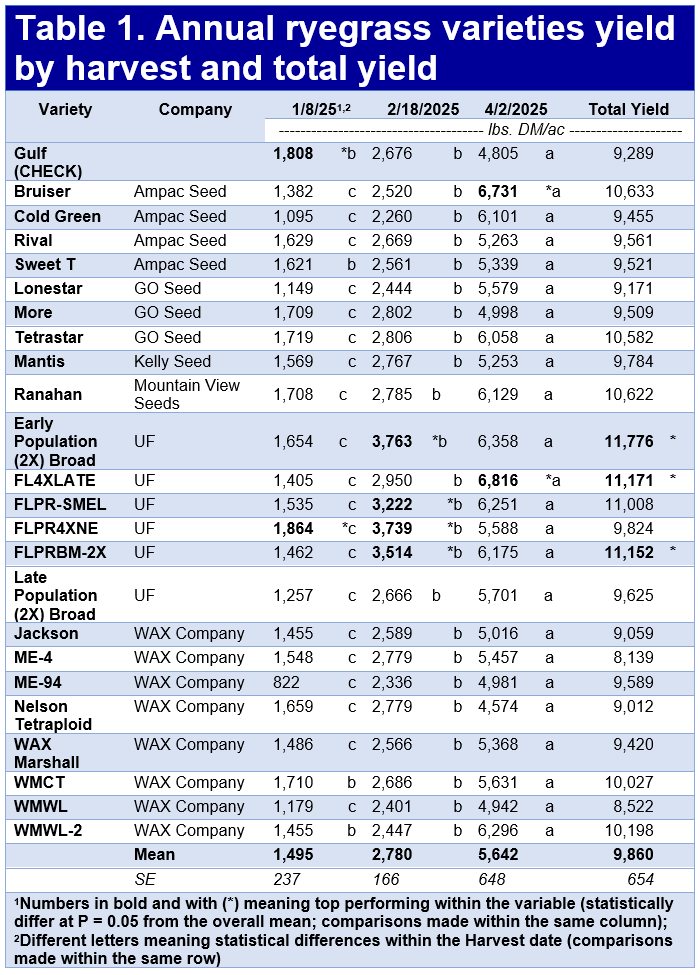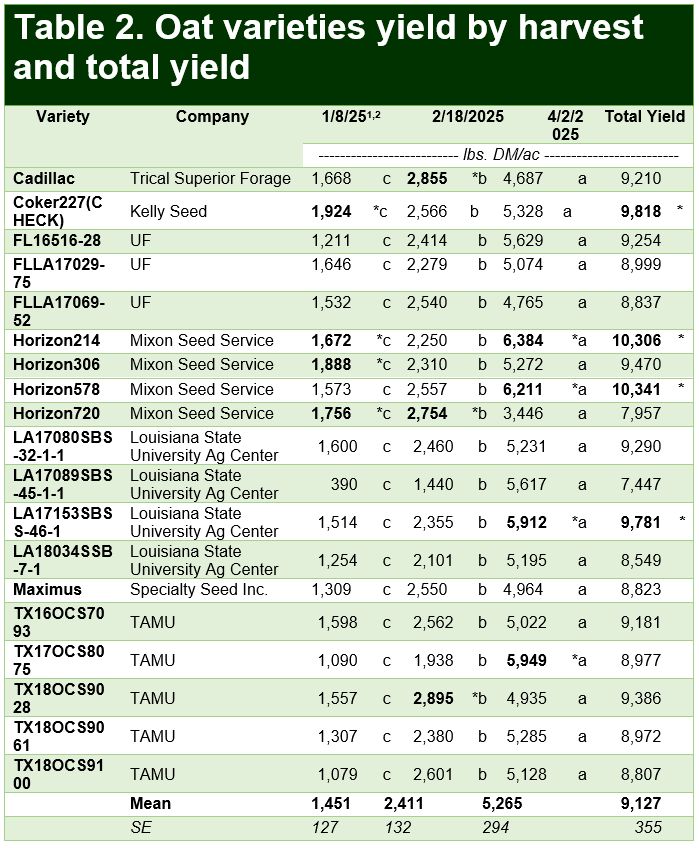Marcelo Wallau, Maria Elena Mailhos,Ashley Kanobroski UF/IFAS Agronomy Department Forage Team, Cheryl Mackowiak, UF/IFAS NFREC Soils Scientist, and Diwakar Vyas, UF/IFAS Animal Sciences Ruminant Nutritionist
Selecting the right forage varieties can significantly impact the productivity and efficiency of any livestock production system. Improved varieties often offer higher biomass accumulation, better quality, and increased disease tolerance. But with so many options available, “How do you select the best one for your farm?“ That’s where the UF/IFAS Forage Team comes in. Through the UF/IFAS Forage Official Variety Trials, we provide Florida producers with science-based information to make informed decisions on which forages to plant each season. This program is a collaborative effort with the leading seed companies that market forage varieties across the state, partially supported by the Florida Cattlemen’s Association (via the Florida Cattle Enhancement Board), Southeast Dairy Producers Check-Off, and Sorghum Check-Off. Each year, we evaluate commercial and experimental varieties of multiple forage species. In the winter, we focus on small grains, including cereal rye, triticale, oats, and wheat, and annual ryegrass. These trials evaluate productivity, quality, and disease tolerance of those forages, and are the basis of our annual variety recommendation lists.
Recommendations are based on three-year, multi-location performance data, compiled in partnership with colleagues from the University of Georgia and Auburn University. The current list of recommended cool-season forage varieties for Florida is available online: Cool-Season Forage Variety Recommendations for Florida. Additionally, the 2024–2025 cool-season forage trial data is now available on our new webpage: Florida Forage In addition to cool-season forages, our team conducts evaluations of annual summer forages, including corn and sorghum for silage, sorghum x sudan hybrids, millet, and forage mixes. We also invite producers to join us at the annual Cool-Season Forage Dairy Tour in the Suwannee Valley. This event offers producers an opportunity to tour local dairy and beef operations while viewing the latest trial results and learning about new and improved forage varieties available on the market. By using UF/IFAS trial data, producers can confidently select varieties that are proven to perform under Florida conditions—ensuring both productivity and profitability.

Figure 1. Difference in performance of oat variety on dairy systems (lagoon irrigation). Legend 567 (left), Cocker 227 (center), and Juggernaut (right) oats, on January 30, 2024, 96 days after planting, with Dr. Cheryl Mackowiak. Credit: Marcelo Wallau, UF/IFAS
–
Trial Details
For the 2024–25 season, the UF/IFAS Forage Team evaluated 73 forage entries from 17 companies and breeding programs as part of its ongoing variety trials. Two separate trials were conducted: The Multi-Cut Trial, focused on hay and grazing potential, which was carried out at the Plant Sciences Research and Education Unit (PSREU) in Marion County, FL. This trial followed a 6-week cutting interval to assess regrowth and cumulative yield. The Single-Cut Trial, targeting silage production, was conducted on-farm at White Oak Dairy Inc. (Lafayette County), Shenandoah Dairy (Suwannee County), and at the PSREU. In this trial, forages were harvested at a single timepoint set by farm management prior to planting spring corn—rather than based on forage maturity.
Table 1 displays the results from the multi-cut ryegrass trial, showcasing promising advances in forage genetics. The University of Florida Forage Breeding Team is currently testing five advanced ryegrass lines, which are not yet commercially available. Notably, several of these lines rank among the top performers in early cuts (first and second) as well as in total biomass production. Dr. Esteban Rios’ team plans to release two of these lines in the coming years, adding to UF’s existing varieties such as Earlyploid and Frostproof. Similarly, Dr. Ali Babar’s breeding program has recently released the Maximus oat and is currently evaluating three additional oat lines for future cultivar release (Table 2). These research efforts aim to provide Florida producers with forage options that are more productive, more resilient, and better suited to the state’s diverse livestock systems.
These variety tests are conducted independently by UF/IFAS faculty and are open for all seed companies and breeding programs. There are other varieties available in the market that were not included in the test, which does not mean they do not perform well. Our variety recommendation lists consider results from multi-location trials, in collaboration with Auburn University and the University of Georgia, and include varieties that have shown superior performance over a three-year testing period. Varieties not entered in the test are liable to be dropped from the recommendation lists because of limited data.
For more information, email the UF Forage Team at forages@ifas.ufl.edu, or contact your local county extension agent.
- Variety Choice Matters – Results from the 2025 Spring Corn Silage Variety Trial - January 9, 2026
- 2025 Southeastern Hay Contest Sets New Records - October 24, 2025
- 2025 Cool-Season Forage Official UF/IFAS Variety Trial Results - September 5, 2025


